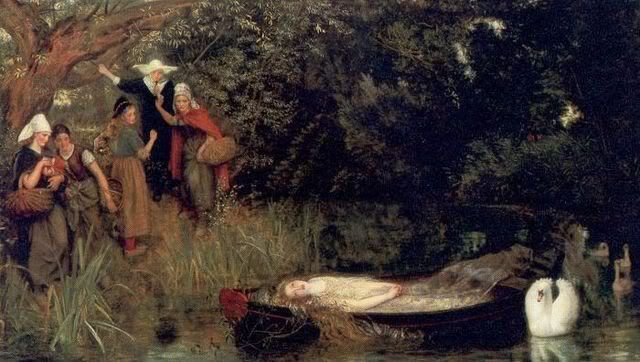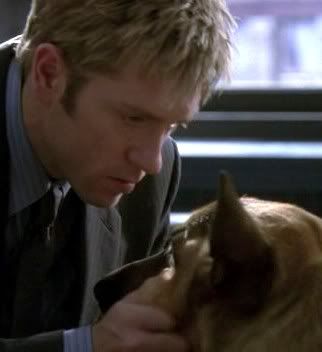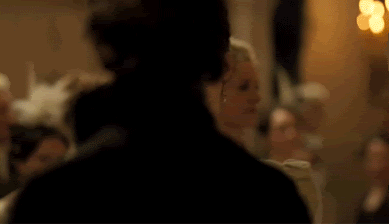|
|
Poetry
Feb 9, 2007 17:56:43 GMT -5
Post by inuvik on Feb 9, 2007 17:56:43 GMT -5
Maggie posting this got me thinking of all the lovely poetry out there: Death is nothing at all.
I have only slipped away into the next room.
I am I and you are you;
Whatever we were to each other that we are still.
Call me by my old familiar name,
speak to me in the easy way which you always used.
Put no difference into your tone;
wear no forced air of solemnity or sorrow.
Laugh as we always laughed
at the little jokes we enjoyed together.
Play, smile, think of me, pray for me.
Let my name be ever the household word it always was.
Let it be spoken without effect,
without the ghost of a shadow on it.
Life means all that it ever meant.
It is the same as it ever was;
there is absolutely unbroken continuity.
What is this death but a negligible accident;
why should I be out of mind because I am out of sight?
I am but waiting for you, for an interval,
somewhere very near,
just around the corner.
All is well. Canon Henry Scott-Holland
(1847-1913) And no, this thread could be poems on any subject--yes cheerful ones too! But this is a lovely one on the same subject too, my mother's favourite actually. "Remember"
Remember me when I am gone away,
Gone far away into the silent land;
When you can no more hold me by the hand,
Nor I half turn to go, yet turning stay.
Remember me when no more day by day
You tell me of our future that you planned:
Only remember me; you understand
It will be late then to counsel or pray.
Yet if you should forget me for awhile
And afterwards remember, do not grieve:
For if the darkness and corruption leave
A vestige of the thoughts I once had,
Better by far you should forget and smile
Than that you should remember and be sad.
~~Christina Rosetti |
|
|
|
Poetry
Feb 10, 2007 16:42:34 GMT -5
Post by inuvik on Feb 10, 2007 16:42:34 GMT -5
And here's one of my favourite poems:
When You Are Old
When you are old and gray and full of sleep,
And nodding by the fire, take down this book,
And slowly read, and dream of the soft look
Your eyes had once, and of their shadows deep;
How many loved your moments of glad grace,
And loved your beauty with love false or true;
But one man loved the pilgrim soul in you,
And loved the sorrows of your changing face.
And bending down beside the glowing bars
Murmur, a little sadly, how love fled
And paced upon the mountains overhead
And his his face amid a crowd of stars.
W. B. Yeats (1865-1939)
|
|
|
|
Poetry
Feb 10, 2007 17:24:17 GMT -5
Post by Chris on Feb 10, 2007 17:24:17 GMT -5
Karma for those wonderfull poems  One of these days I might share some poems too. Take care and keep smiling - Chris  |
|
|
|
Poetry
Feb 10, 2007 19:31:18 GMT -5
Post by mlm828 on Feb 10, 2007 19:31:18 GMT -5
On a lighter note, the following is an excerpt from "Under Which Lyre: A Reactionary Tract for the Times," by W. H. Auden. I actually read this at my law school graduation. (I was a lot younger then  ) Keep well the Hermetic Decalogue,
Which runs as follows: --
Thou shalt not do as the dean pleases,
Thou shalt not write thy doctor's thesis
On education,
Thou shalt not worship projects nor
Shalt thou or thine bow down before
Administration.
Thou shalt not answer questionnaires
Or quizzes upon World-Affairs,
Nor with compliance
Take any test. Thou shalt not sit
With statisticians nor commit
A social science.
Thou shalt not be on friendly terms
With guys in advertising firms,
Nor speak with such
As read the Bible for its prose,
Nor, above all, make love to those
Who wash too much.
Thou shalt not live within thy means
Nor on plain water and raw greens.
If thou must choose
Between the chances, choose the odd;
Read The New Yorker, trust in God;
And take short views. |
|
|
|
Poetry
Feb 10, 2007 21:54:57 GMT -5
Post by maggiethecat on Feb 10, 2007 21:54:57 GMT -5
I love that we have so many on this board who appreciate W.H. Auden and Yeats (in the right mood, "The Song of Wandering Angus" still reduces me to tears). On an infinitely more frivolous note, I have to contribute one of the few poems I ever committed to memory, by the glorious Dorothy Parker. No doubt because of my demented sense of humor, I actually find it inspirational.  Razors pain you Razors pain you
Rivers are damp
Acids stain you
And drugs cause cramp.
Gas smells awful
Nooses give
Guns aren't lawful . . .
You might as well live.  |
|
|
|
Poetry
Feb 11, 2007 1:54:06 GMT -5
Post by rducasey on Feb 11, 2007 1:54:06 GMT -5
OK you must pardon my delirium as I have been fighting the flu and it is the middle of the night. (I feel so much better, thank you.) and I am loving this poetry thread. MLM, that is a great poem about lawyers, and Maggie, I love Dorothy Parker as well. I have to contribute one of the few poems I ever committed to memory, by the glorious Dorothy Parker. When I read this I couldn't help commenting on a hobby I have had since I was young to memorize poetry. I never understood the reason I felt a need to memorize it but perhaps it was preparing me for this board where we can all probably run through a whole episode verbatim.(Sometimes while stuck in traffic I will do this to pass the time. "OK, how far can I get into Marlon's before this jam opens up. "Good morning. That's nice. Been a long time. Been too long, Go 'way Hank. Don't answer it. I'm not going to, just read me the numbers." You get my drift.) So anyway, (perhaps my fever is higher than I thought) here are a few of the things I have stuck in my head that prevents me from remembering the things I am suppose to remember like important meetings, dr's appointments, and picking up my husband's shirts at the cleaners. Much of William Shakespeare ( I loved loved loved memorizing those soliloquies.)
Evangeline by Longfellow
If by Rudyard Kipling
Thanatopsis by William Cullen Bryant
Ode to a Grecian Urn by Keats
The Highwayman, by Noyes
Casey at the Bat by Thayer
Old Ironsides by Oliver Wendell Holmes
The Rime of the Ancient Mariner by Samuel Taylor Coleridge
The Raven by Poe
The Gettsburg Address by Abe LincolnOK time for my medicine, back to bed. Oh my gosh, and I just looked down below my post here and Natasha has posted a new fanfic. Oh boy oh boy, you have just the right medicine for a sick woman N. Forget going back to bed, I will stay and read it. Thank you. Love your fanfics. |
|
|
|
Poetry
Feb 11, 2007 11:11:01 GMT -5
Post by Duchess of Lashes on Feb 11, 2007 11:11:01 GMT -5
This poem may not be particularly lovely, but it remains, even now, years after I first discovered it in a first year University English course, one of my favorite Alfred Lord Tennyson works.
The Captain
He that only rules by terror
Doeth grievous wrong.
Deep as hell I count his error.
Let him hear my song.
Brave the Captain was; the seamen
Made a gallant crew,
Gallant sons of English freemen,
Sailors bold and true.
But they hated his oppression;
Stern he was and rash,
So for every light transgression
Doom’d them to the lash.
Day by day more harsh and cruel
Seem’d the Captain’s mood.
Secret wrath like smother’d fuel
Burnt in each man’s blood.
Yet he hoped to purchase glory,
Hoped to make the name
Of his vessel great in story,
Wheresoe’er he came.
So they past by capes and islands,
Many a harbor-mouth,
Sailing under palmy highlands
Far within the South.
On a day when they were going
O’er the lone expanse,
In the north, her canvas flowing,
Rose a ship of France.
Then the Captain’s color heighten’d,
Joyful came his speech;
But a cloudy gladness lighten’d
In the eyes of each.
‘Chase,’ he said; the ship flew forward,
And the wind did blow;
Stately, lightly, went she norward,
Till she near’d the foe.
Then they look’d at him they hated,
Had what they desired;
Mute with folded arms they waited–
Not a gun was fired.
But they heard the foeman’s thunder
Roaring out their doom;
All the air was torn in sunder,
Crashing went the boom,
Spars were splinter’d, decks were shatter’d,
Bullets fell like rain;
Over mast and deck were scatter’d
Blood and brains of men.
Spars were splinter’d; decks were broken;
Every mother’s son–
Down they dropt–no word was spoken–
Each beside his gun.
On the decks as they were lying,
Were their faces grim.
In their blood, as they lay dying,
Did they smile on him.
Those in whom he had reliance
For his noble name
With one smile of still defiance
Sold him unto shame.
Shame and wrath his heart confounded,
Pale he turn’d and red,
Till himself was deadly wounded
Falling on the dead.
Dismal error! fearful slaughter!
Years have wander’d by;
Side by side beneath the water
Crew and Captain lie;
There the sunlit ocean tosses
O’er them mouldering,
And the lonely seabird crosses
With one waft of the wing.
|
|
Deleted
Deleted Member
Posts: 0
|
Poetry
Feb 13, 2007 11:04:15 GMT -5
Post by Deleted on Feb 13, 2007 11:04:15 GMT -5
This poem may not be particularly lovely, but it remains, even now, years after I first discovered it in a first year University English course, one of my favorite Alfred Lord Tennyson works. The CaptainHe that only rules by terror Doeth grievous wrong. Deep as hell I count his error. Let him hear my song. Brave the Captain was; the seamen Made a gallant crew, Gallant sons of English freemen, Sailors bold and true. But they hated his oppression; Stern he was and rash, So for every light transgression Doom’d them to the lash. Day by day more harsh and cruel Seem’d the Captain’s mood. Secret wrath like smother’d fuel Burnt in each man’s blood. Yet he hoped to purchase glory, Hoped to make the name Of his vessel great in story, Wheresoe’er he came. So they past by capes and islands, Many a harbor-mouth, Sailing under palmy highlands Far within the South. On a day when they were going O’er the lone expanse, In the north, her canvas flowing, Rose a ship of France. Then the Captain’s color heighten’d, Joyful came his speech; But a cloudy gladness lighten’d In the eyes of each. ‘Chase,’ he said; the ship flew forward, And the wind did blow; Stately, lightly, went she norward, Till she near’d the foe. Then they look’d at him they hated, Had what they desired; Mute with folded arms they waited– Not a gun was fired. But they heard the foeman’s thunder Roaring out their doom; All the air was torn in sunder, Crashing went the boom, Spars were splinter’d, decks were shatter’d, Bullets fell like rain; Over mast and deck were scatter’d Blood and brains of men. Spars were splinter’d; decks were broken; Every mother’s son– Down they dropt–no word was spoken– Each beside his gun. On the decks as they were lying, Were their faces grim. In their blood, as they lay dying, Did they smile on him. Those in whom he had reliance For his noble name With one smile of still defiance Sold him unto shame. Shame and wrath his heart confounded, Pale he turn’d and red, Till himself was deadly wounded Falling on the dead. Dismal error! fearful slaughter! Years have wander’d by; Side by side beneath the water Crew and Captain lie; There the sunlit ocean tosses O’er them mouldering, And the lonely seabird crosses With one waft of the wing. I like that - a lot! It brings so many images to my mind. |
|
Deleted
Deleted Member
Posts: 0
|
Poetry
Feb 13, 2007 11:13:03 GMT -5
Post by Deleted on Feb 13, 2007 11:13:03 GMT -5
This one has been my favorite for years - I discovered it when I was about 15 years old and never forgot it.
Ad Finum
by Ella Wheeler Wilcox
On the white throat of useless passion
That scorched my soul with its burning breath
I clutched my fingers in murderous fashion
And gathered them close in a grip of death;
For why should I fan, or feed with fuel,
A love that showed me but blank despair?
So my hold was firm, and my grasp was cruel -
I meant to strangle it then and there!
I thought it was dead. But, with no warning,
It rose from its grave last night and came
And stood by my bed till the early morning.
And over and over it spoke your name.
Its throat was red where my hands had held it;
It burned my brow with its scorching breath;
And I said, the moment my eyes beheld it,
'A love like this can know no death.'
For just one kiss that your lips have given
In the lost and beautiful past to me,
I would gladly barter my hopes of Heaven
And all the bliss of Eternity.
For never a joy are the angels keeping,
To lay at my feet in Paradise,
Like that of into your strong arms creeping,
And looking into your love lit eyes.
I know, in the way that sins are reckoned,
This thought is a sin of the deepest dye;
But I know too that if an angel beckoned,
Standing close by the Throne on High,
And you, adown by the gates infernal,
Should open your loving arms and smile,
I would turn my back on things supernal,
To lie on your breast a little while.
To know for an hour you were mine completely-
Mine in body and soul, my own-
I would bear unending tortures sweetly,
With not a murmur and not a moan.
A lighter sin or lesser error
Might change through hope or fear divine;
But there is no fear, and hell hath no terror,
To change or alter a love like mine.
|
|
|
|
Poetry
Feb 13, 2007 11:42:21 GMT -5
Post by shmeep on Feb 13, 2007 11:42:21 GMT -5
I love that we have a poetry thread now! I never considered myself much of a fan of poetry, but every once in a while I'll read one that really touches me. My favorite poet of all time is Tennyson and my favorite poem by him is The Lady of Shalott--possibly because it is a poem about someone with such a beautiful name (although the name is never stated within the poem itself) and I always felt that it was my poem in a way. Here's a little something about it: The poem 'The Lady of Shalott' by Tennyson is thought to be loosely based on Elaine, the fair maid who was in love with Sir Lancelot of Arthurian legend, as portrayed in Sir Thomas Malory's 'Morte D'Arthur'. Lancelot, alas, only had eyes for Queen Guinevere, so Elaine locked herself in a tower on the island of Shalott and died of a broken heart. Of course I don't relate to the Elaine of the story in any way. I have never been locked away in a tower, nor do I have any intention of ever dying of a broken heart. But that story is what first popularized my name and it also evokes such beautiful romantic pictures of a beautiful woman in white dying as she floats down the river in a boat...  So...sorry it's so long, but here it is: The Lady of Shallot
On either side the river lie
Long fields of barley and of rye,
That clothe the wold and meet the sky;
And thro' the field the road runs by
To many-tower'd Camelot;
And up and down the people go,
Gazing where the lilies blow
Round an island there below,
The island of Shalott.
Willows whiten, aspens quiver,
Little breezes dusk and shiver
Thro' the wave that runs for ever
By the island in the river
Flowing down to Camelot.
Four gray walls, and four gray towers,
Overlook a space of flowers,
And the silent isle imbowers
The Lady of Shalott.
By the margin, willow veil'd,
Slide the heavy barges trail'd
By slow horses; and unhail'd
The shallop flitteth silken-sail'd
Skimming down to Camelot:
But who hath seen her wave her hand?
Or at the casement seen her stand?
Or is she known in all the land,
The Lady of Shalott?
Only reapers, reaping early
In among the bearded barley,
Hear a song that echoes cheerly
From the river winding clearly,
Down to tower'd Camelot:
And by the moon the reaper weary,
Piling sheaves in uplands airy,
Listening, whispers " 'Tis the fairy
Lady of Shalott."
PART II
There she weaves by night and day
A magic web with colours gay.
She has heard a whisper say,
A curse is on her if she stay
To look down to Camelot.
She knows not what the curse may be,
And so she weaveth steadily,
And little other care hath she,
The Lady of Shalott.
And moving thro' a mirror clear
That hangs before her all the year,
Shadows of the world appear.
There she sees the highway near
Winding down to Camelot:
There the river eddy whirls,
And there the surly village-churls,
And the red cloaks of market girls,
Pass onward from Shalott.
Sometimes a troop of damsels glad,
An abbot on an ambling pad,
Sometimes a curly shepherd-lad,
Or long-hair'd page in crimson clad,
Goes by to tower'd Camelot;
And sometimes thro' the mirror blue
The knights come riding two and two:
She hath no loyal knight and true,
The Lady of Shalott.
But in her web she still delights
To weave the mirror's magic sights,
For often thro' the silent nights
A funeral, with plumes and lights
And music, went to Camelot:
Or when the moon was overhead,
Came two young lovers lately wed:
"I am half sick of shadows," said
The Lady of Shalott.
PART III
A bow-shot from her bower-eaves,
He rode between the barley-sheaves,
The sun came dazzling thro' the leaves
And flamed upon the brazen greaves
Of bold Sir Lancelot.
A red-cross knight for ever kneel'd
To a lady in his shield,
That sparkled on the yellow field,
Beside remote Shalott.
The gemmy bridle glitter'd free,
Like to some branch of stars we see
Hung in the golden Galaxy.
The bridle bells rang merrily
As he rode down to Camelot:
And from his blazon'd baldric slung
A mighty silver bugle hung,
And as he rode his armour rung,
Beside remote Shalott.
All in the blue unclouded weather
Thick-jewell'd shone the saddle-leather
The helmet and the helmet-feather
Burn'd like one burning flame together,
As he rode down to Camelot.
As often thro' the purple night,
Below the starry clusters bright,
Some bearded meteor, trailing light,
Moves over still Shalott.
His broad clear brow in sunlight glow'd;
On burnish'd hooves his war-horse trode;
From underneath his helmet flow'd
His coal-black curls as on he rode,
As he rode down to Camelot.
From the bank and from the river
He flash'd into the crystal mirror,
"Tirra lirra," by the river
Sang Sir Lancelot.
She left the web, she left the loom,
She made three paces thro' the room,
She saw the water-lily bloom,
She saw the helmet and the plume,
She look'd down to Camelot.
Out flew the web and floated wide;
The mirror crack'd from side to side;
"The curse is come upon me," cried
The Lady of Shalott.
PART IV
In the stormy east-wind straining,
The pale yellow woods were waning,
The broad stream in his banks
complaining
Heavily the low sky raining
Over tower'd Camelot;
Down she came and found a boat
Beneath a willow left afloat,
And round about the prow she wrote
'The Lady of Shalott'.
And down the river's dim expanse
Like some bold seer in a trance,
Seeing all his own mischance--
With a glassy countenance
Did she look to Camelot.
And at the closing of the day
She loosed the chain, and down she lay;
The broad stream bore her far away,
The Lady of Shalott.
Lying, robed in snowy white
That loosely flew to left and right--
The leaves upon her falling light--
Thro' the noises of the night
She floated down to Camelot:
And as the boat-head wound along
The willowy hills and fields among,
They heard her singing her last song,
The Lady of Shalott.
Heard a carol, mournful, holy,
Chanted loudly, chanted lowly,
Till her blood was frozen slowly,
And her eyes were darken'd wholly,
Turn'd to tower'd Camelot.
For ere she reach'd upon the tide
The first house by the water-side,
Singing in her song she died,
The Lady of Shalott.
Under tower and balcony,
By garden-wall and gallery,
A gleaming shape she floated by,
Dead-pale between the houses high,
Silent into Camelot.
Out upon the wharfs they came,
Knight and burgher, lord and dame,
And round the prow they read her name,
The Lady of Shalott.
Who is this? and what is here?
And in the lighted palace near
Died the sound of royal cheer;
And they cross'd themselves for fear,
All the knights at Camelot:
But Lancelot mused a little space;
He said, "She has a lovely face;
God in his mercy lend her grace,
The Lady of Shalott." |
|
|
|
Poetry
Feb 13, 2007 16:57:59 GMT -5
Post by Chris on Feb 13, 2007 16:57:59 GMT -5
I am a bit nervous here, because this is actually a poem I wrote years ago, but somehow it feels right to post it here - So like Marty said; I hope you like itYou come to a strange place.
You know the language
- or so you think.
But even so, you realize
that there is so much
you don't know.
When you come to a new place
you're prepared
- at least that's what you think.
But you learn soon enough
that you can never, ever
prepare enough.
Coming as a stranger
you know, you're a lot different
than the people you meet.
But you never expected
to be so strange
to be that different.
If you come as a stranger
you ask a lot of questions
- but you never knew
that you had to ask that many
and no matter how many you ask
it will never be the right ones.
You came to a strange place.
Maybe you didn't understand
and you certainly felt different
and questioned everything.
But soon it's not strange anymore
and it feels like home.
When you come to this World
it is a strange place.
Your whole life
is a journey into new places
but in the end you will see
that we are all strangers and yet the same.- Chris  |
|
|
|
Poetry
Feb 13, 2007 17:09:54 GMT -5
Post by rducasey on Feb 13, 2007 17:09:54 GMT -5
Chris that poem is beautiful, and do I like it?, to quote Jim "absolutely". And does it just seem so appropriate to this board? Again I will say, as I have said before, it is amazing how much talent is on this board. Thanks for sharing. Karma to you!
|
|
|
|
Poetry
Feb 13, 2007 17:34:13 GMT -5
Post by inuvik on Feb 13, 2007 17:34:13 GMT -5
Here's one that was sent to a group I'm in.
REFLECTION - KINDNESS
Before you know what kindness really is
you must lose things,
feel the future dissolve in a moment
like salt in a weakened broth.
What you held in your hand,
what you counted and carefully saved,
all this must go so you know
how desolate the landscape can be
between the regions of kindness.
How you ride and ride
thinking the bus will never stop,
the passengers eating maize and chicken
will stare out the window forever.
Before you learn the tender gravity of kindness,
you must travel where the Indian in a white poncho
lies dead by the side of the road.
You must see how this could be you,
how he too was someone
who journeyed through the night with plans
and the simple breath that kept him alive.
Before you know kindness as the deepest thing inside,
you must know sorrow as the other deepest thing.
You must wake up with sorrow.
You must speak to it till your voice
catches the thread of all sorrows
and you see the size of the cloth.
Then it is only kindness that makes sense anymore,
only kindness that ties your shoes
and sends you out into the day to mail letters and purchase bread, only kindness that raises its head
from the crowd of the world to say
it is I you have been looking for,
and then goes with you every where
like a shadow or a friend.
~ Naomi Shihab Nye ~
|
|
|
|
Poetry
Feb 15, 2007 20:15:45 GMT -5
Post by maggiethecat on Feb 15, 2007 20:15:45 GMT -5
Ah, Shmeep, thank you so much for the Tennyson, complete with the beautiful Pre-Raphaelite painting.  rducasey, this one's for you, to make you laugh. I can't claim to have as much poetry committed to memory as you, but a night when the moon is a ghostly galleon tossed upon cloudy seas still zaps me back to The Highwayman, riding, riding, riding, up to the old inn door . . . In sixth grade we all had to memorize a poem and recite it before the class. Sober classmates came in with the likes of "The Village Blacksmith" and "The Midnight Ride of Paul Revere" and "Father William." I, being a perverse child (really?!) memorized the following, which I can still do at a drop of a hat and which, because of its gruesome nature, is a big hit at children's parties. I bet your third graders would love it.  George Who Played With a Dangerous Toy, and Suffered a Catastrophe of Considerable Dimensions George Who Played With a Dangerous Toy, and Suffered a Catastrophe of Considerable Dimensions
by Hillaire Belloc
When George's Grandmamma was told
That George has been as good as Gold,
She Promised in the afternoon
To Buy him an Immense BALLOON.
And so she did; but when it came
It got into the candle flame,
And being of a dangerous sort
Exploded with a Loud Report!
The Lights went out! The Windows broke!
The room was filled with reeking smoke!
And in the darkness shrieks and yells
Were mingled with Electric Bells,
And falling masonry and groans,
And crunching, as of broken bones,
And dreadful shrieks, when, worst of all,
The House itself began to fall!
It tottered, shuddered, to and fro,
Then crashed into the street below ---
Which happened to be Savile Row.
When Help arrived, among the Dead
Were Cousin Mary, Little Fred,
The Footmen (both of them), the Groom,
The man that cleaned the Billiard-Room,
The Chaplain, and the Still-Room Maid.
And I am dreadfully afraid
That Monsieur Champignon, the Chef,
Will now be permanently deaf ---
And both his aides are much the same;
While George, who was in part to blame,
Received, you will regret to hear,
A nasty lump behind his ear.
The moral is that little Boys
Should not be given dangerous Toys. |
|
|
|
Poetry
Feb 15, 2007 21:45:25 GMT -5
Post by rducasey on Feb 15, 2007 21:45:25 GMT -5
Ah Maggie, I have a Poem of the Day and I printed this out and it will be tomorrows. I love it! I will let you know how they liked it and I bet they will. Every now and then, the kids, in trying to keep up with me I guess, come in the day after with it memorized, but this is a bit much for them. I may feel compelled to memorize it though so the next time we meet we can have a poem-off! We'll stand right there on 48th Street seeing who can say it the fastest. hahahahahaha Thanks!
|
|







 )
)






